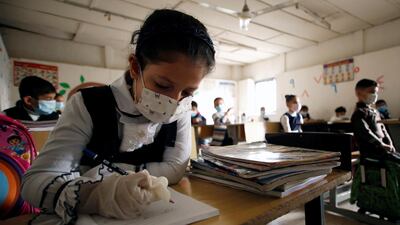Schools are being "excessively risk-averse" in their approach to Covid-19 in a policy that is damaging children's education, according to a team of specialists.
European governments need to undertake an "urgent rethink" of policies designed to contain coronavirus to avoid widespread school closures this winter, children's infectious disease experts said.
They said the effects of missed lessons on children’s mental health and education during the first wave of the virus far outweighed the benefits of shutting schools.
"The default position for primary schools should be the implementation of less restrictive infection control requirements," the medics wrote in the British Medical Journal paper published on Sunday.
This would include not enforcing compulsory mask-wearing, no requirement for entire bubbles to isolate after a single case at school, and for teachers to be a priority for the Covid-19 vaccine.
The blanket policy used in Europe for children of all ages is “not evidence based and is too restrictive and inflexible”, said the report, published online in the Archives of Disease in Childhood.
It could also significantly disadvantage primary school pupils and their families.
School policies across Europe made no distinction between primary and secondary school, "despite the known differences in the risks of infection and spread in these two age groups".
With no provision to tighten or relax restrictions in secondary and primary schools, the younger children could be severely hampered.
“That’s because young children get between 4 and 8 respiratory infections every winter and the symptoms of a bad cold or other viral infection often overlap with those of Covid-19,” the report said.
“And if it’s difficult to get a test or takes a while to get a result, young children will inevitably miss significant quantities of schooling this winter.”
The recommendation in some European countries, including Britain, for an entire family to isolate if a child has coronavirus symptoms while awaiting their test results limits parents’ ability to work and pupils’ freedom to attend school.
The report called for a more “pragmatic, evidence-based approach to primary schools”, which recognised the unintended consequences of “excessively risk-averse approaches”.
It also recommended that schools should be prioritised for rapid Covid-19 saliva tests.


